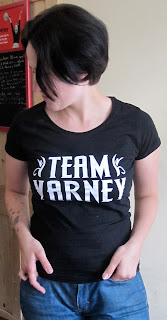So that's that, then. For those who
have followed me on my epic, twitter sarcasm spree, I stand before
you, the only person living who has read the whole of Varney, The
Vampyre.
I don't say that
lightly. As far as I'm aware, most versions only bother to print up
to chapter 96 or so, and just leave the rest of the tome blank. Even
the scholarly preface in my edition mentions nothing which occurs
after Volume II. Alone. I am alone.1 The rest of you quit weeks ago.
If I'm honest, I
can't say I blame you. As a novel, this does not hang together. I
guess it's only human to give up when it becomes clear that not even
the author had any real clue what was going to happen next, nor,
indeed, what had happened previously. It's only human, after all, to want
a story with a cohesive plot, a small cast of characters who each have clear
goals, drives and motives. There is no
place in modern literature for enormous, meandering
doorstop tomes that allow themselves to indulge every little whim and
silly joke that takes their fancy. Hand on heart, I can see your
point entirely.
You fucking
lightweights.
It rocks. Once you
stop worrying about such trifling concerns as plot, character
consistency, or direction it is enormous fun to read. In fact, it is
1166 pages of perfect delight. Let me reiterate. 1166 pages of
AWESOME. Plus, the character arc of Sir Francis is fascinating. Okay,
I will concede that, like the character arc of the Doctor in the
classic series, it does need to be back engineered by a diligent fan,
but still...
Actually,
classic series Doctor Who is
what this most resembles. Take one innovative, brilliant idea, (Time
travel, for example, or Vampires) and enigma of a main character (say, The Doctor or Sir
Francis) an initial problem (perhaps two schoolteachers getting kidnapped by an irascible time traveller, or an ancient family being stony broke) and GO. It will take you all
kinds of places, raise all kinds of issues, have micro-stories within
it (some of which have insane loose ends, others of which could do with
a bit of pruning) create contradictions, paradoxes, and have the most
charming, changeable, quixotic and prevaricating main character you
will ever encounter.
Stick
with it and you'll come to see the guiding principle, nay, the sheer
bloody joy of Varney, the Vampyre
has fuck all to do with a novel
as we currently understand it. It's not about vampires, not really,
it's about people and the silly things we do, and how easy we are to manipulate. And what it does, in the simplest and purest form is by
take every possible permeation of the vampire genre that
you have ever encountered and run with it.
That's
what I say; there has been nothing original since this. Not ever. Not
at any point2.
So, go
on, give it one more chance. We can do this together. In the next couple of weeks I'll be posting The
Hitch-hiker's Guide to Varney the Vampyre, breaking
it down into its distinct episodes in order to encourage and amuse
the intrepid Varney
reader. It may have many omissions, contain much that is apocryphal, or at least wildly inaccurate, but it will tell you highlights, central cast, genre and all the marvels of this much maligned novel - and all for
less than thirty Alterian Dollars a day.
It'll
be like Spark Notes, only sweary.
Don't
forget your towel.
1If
you have actually read the whole shebang, then do say so in the
comments. We rule. We should have T-shirts. Actually, we do have
t-shirts. See?
2Okay,
I'll admit it, Sir Francis never actually sparkles,
but... blah. Had to nit-pick, didn't you?
